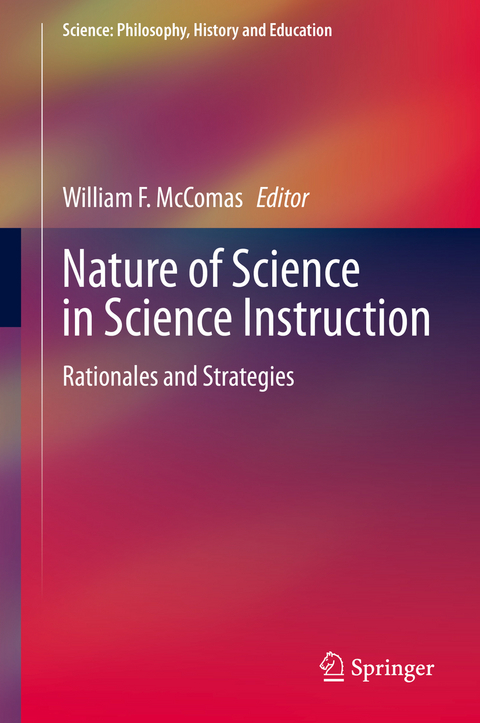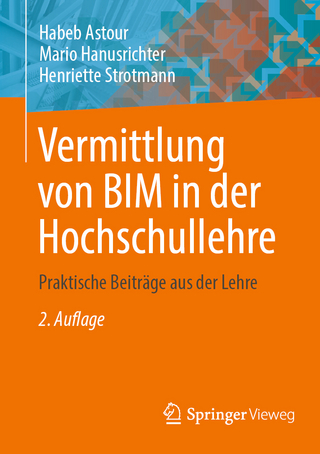
Nature of Science in Science Instruction
Springer International Publishing (Verlag)
978-3-030-57238-9 (ISBN)
lt;b>William F. McComas is a Distinguished Professor and the inaugural holder of the Parks Family Endowed Professorship in Science Education at the University of Arkansas. He is editor of The Language of Science Education and co-author of a new account of The Scopes Monkey Trial.McComas was a Fulbright Fellow at Dublin City University, has been elected a Fellow of the American Association for the Advancement of Science (AAAS), and currently serves as the Editor of the American Biology Teacher. He is the recipient of accolades such as the ASTA Outstanding Mentor and Outstanding Science Teacher Educator awards, and the Ohaus Award for innovations in college science teaching. Bill is particularly proud of the students whose dissertations he chaired, 15 of whom are now professors of science education.
1.Forward to Series; Kostas Kampourakis.- 2.Preface to Book; Richard Duschl.- 3.Introduction; William McComas.- 4.Acknowledgements; William McComas.- SECTION ONE: Nature of Science in Science Teaching and Learning: Introduction.- 5. Nature of Science in the Science Curriculum: Meaning, History of Advocacy and Rationales; William McComas and Michael Clough.- 6. Considering a Consensus View of Nature of Science Content for School Science; William McComas.- 7. Principal Elements of NOS: Informing Science Teaching While Dispelling the Myths; William McComas.- 8. Nature of Science and Classroom Practice: A Review of the Literature with Implications for Effective NOS Instruction; William McComas, Michael Clough, and Noushin Nouri.- SECTION TWO: Nature of Science Instruction: Foundation Knowledge for Nature of Science Instruction.- 9. Beyond Experiments: Exploring Valid and Reliable Methods in Science; Sandra West-Moody and Susan Schwinning.- 10. Exchanging the Myth of the Scientific Method for a More Authentic Description of Science; Rebecca Reiff-Cox.- 11. Challenges and Opportunities of Theory-Laden Observation and Subjectivity; William McComas.- 12. Distinguishing Science, Engineering and Technology; Gerry Rau and Allision Antink-Meyer.- SECTION THREE: Teaching about Nature of Science: Generalized Instructional Perspectives.- 13. Using Metacognitive Prompts to Foster Nature of Science Learning; Erin Peters Burton and Stephen R. Burton.- 14. Teaching Nature of Science through a Critical Thinking Approach; Hagop Yacoubian.- 15. The Nature of Science Card Exchange: Introducing the Philosophy of Science; William Cobern and Cathleen Loving.- 16. Reflecting on Nature of Science through the Philosophy of Science; Lynda Dunlop and Jelle DeSchrijver.- 17. Preparing Science Teachers to Overcome Obstacles to Teach Nature of Science; Michael Clough, Benjamin Herman and Joanne Olson.- 18. Perspectives for Teaching about How Science Works; Fred J.J.M. Janssen, H.B. Westbroek, I. Landa, Britt van der Ploeg, and Jacqueline Muijlwijk-Koezen.- 19. Framing and Teaching Nature of Science as Questions; Michael Clough.- 20. Real and Imagined Cases to Communicate Aspects of Nature of Science; David Boersema.- 21. Avoiding De-Natured Science: Integrating Nature of Science into Science Instruction; Norman Lederman, F. Abd-El-Khalick & Judith Lederman.- 22. Blending Nature of Science with Science Content Learning; Irene Neumann, Hanno Michel and Nikos Papdouris.- 23. Using Digital Technology to Enhance Learners' Conceptions of Nature of Science; Isha DeCoito.- 24. Using Exemplars to Improve Nature of Science Understanding; Jennifer Parrish, Grant Gardner and Cindi Smith-Walters.- 25. Practical Learning Resources and Teacher Education Strategies for Understanding Nature of Science; Sibel Erduran, Ebru Kaya, Alison Cullinane, Onur Imren & Sila Kaya.- 26. Arguing to Learn and Learning to Argue with Elements of Nature of Science; Hasan Deniz, Lisa Borgerding and Elif Adibelli-Sahin.- 27. New Frontiers in Classroom NOS Assessment; Deborah Hanuscin, Mojtaba Khajeloo and Benjamin Herman.- SECTION FOUR: Teaching Aspects of the Nature of Scienc: Specific Instructional Strategies and Settings.- 28. Using Core Science Ideas to Teach Aspects of Nature of Science in the Elementary Grades; Meredith Park Rogers, Ranu Roy and Alexander Gerber.- 29. Improving Nature of Science Instruction in Elementary Classrooms with Modified Trade Books and Educative Curriculum Materials; Jeanne Brunner and Fouad Abd-El-Khalick.- 30. Using a Problem Based Learning Approach to Teach Nature of Science; Charbel El-Hani, Nei de Freitas Nunes-Neto and Pedro Luís Bernardo da Rocha.- 31. Storytelling as a Pedagogical Tool in Nature of Science Instruction; Nausica Kapsala and Evangelia Mavrikaki.- 32. The Story Behind the Science; Michael Clough.- 33. A Typology of Approaches for Using History of Science in Science Instruction; William McComas.- 34. Using Anecdotes from the History of the Sciences to Illustrate General Aspects of Nature of Science; William McComas and Kostas Kampourakis.- 35. Using the Pendulum to Teach Elements of Nature of Science; Michael Matthews.- 36. Using Historical Inquiry Cases to Learn Nature of Science Analytical Skills; Douglas Allchin.- 37. Teaching the Limits of Science with Card Sorting Activities; Lena Hansson.- 38. Supporting Science Teachers' Nature of Science Understanding through a Specially Designed Philosophy of Science Course; Kostas Kampourakis.- 39. Learning Aspects of Nature of Science through Authentic Research Experiences; Elizabeth Edmondson, Stephen Burgin, Dina Tsybulsky and Jennifer Maeng.- 40. Embedded Research Experiences to Enhance Nature of Science Understanding for Preservice Teachers; Julie Angle.- 41. Introducing Human Elements of Science through a Context-Rich Thematic Project; Lotta Leden and Lena Hansson.- 42.Informal Learning Environments and their Potential Role in Communicating Nature of Science; Michael Reiss andWilliam McComas.
| Erscheinungsdatum | 26.08.2020 |
|---|---|
| Reihe/Serie | Science: Philosophy, History and Education |
| Zusatzinfo | XXIV, 748 p. 98 illus., 27 illus. in color. |
| Verlagsort | Cham |
| Sprache | englisch |
| Maße | 155 x 235 mm |
| Gewicht | 1457 g |
| Themenwelt | Sozialwissenschaften ► Pädagogik ► Erwachsenenbildung |
| Schlagworte | History and Philosophy of Science • History of Science • instructional strategies • Nature of Science • NOS • philosophy of science • science classroom • science curriculum • science instruction • science learning • science teacher education • science teaching • Teacher Education |
| ISBN-10 | 3-030-57238-2 / 3030572382 |
| ISBN-13 | 978-3-030-57238-9 / 9783030572389 |
| Zustand | Neuware |
| Haben Sie eine Frage zum Produkt? |
aus dem Bereich


